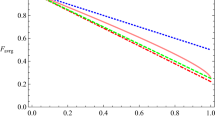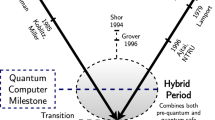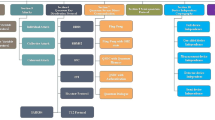Abstract
We present a quantum secret sharing protocol against collective-amplitude-damping noise. Each logical qubit is encoded in two qubit noiseless states. So it can function over such a noisy channel. The two agents encode their messages on each logical qubit only by performing a permutation operation on two physical qubits. Although each logical qubit received by each agent only carries a bit of information, the boss Alice can read out her agents’ information by discriminating two orthogonal states by performing single-qubit measurements assisted by local operation and classical communication (LOCC).
Similar content being viewed by others
References
Hillery M, Bužek V, Berthiaume A. Quantum secret sharing. Phys Rev A, 1999, 59: 1829–1834
Karlsson A, Koashi M, Imoto N. Quantum entanglement for secret sharing and secret splitting. Phys Rev A, 1999, 59: 162–168
Cleve R, Gottesman D, Lo H K. How to share a quantum secret. Phys Rev Lett, 1999, 83: 648–651
Xiao L, Long G L, Deng F G, et al. Efficient multiparty quantum secret sharing schemes. Phys Rev A, 2004, 69: 052307
Gottesman D. Theory of quantum secret sharing. Phys Rev A, 2000, 61: 042311
Karimipour V, Bahraminasab A, Bagherinezhad S. Entanglement swapping of generalized cat states and secret sharing. Phys Rev A, 2002, 65: 042320
Tittel W, Zbinden H, Gisin N. Experimental demonstration of quantum secret sharing. Phys Rev A, 2001, 63: 042301
Bandyopadhyay S. Teleportation and secret sharing with pure entangled states. Phys Rev A, 2000, 62: 012308
Guo G P, Guo G C. Quantum secret sharing without entanglement. Phys Lett A, 2003, 310: 247–251
Chau H F. Practical scheme to share a secret key through a quantum channel with a 27.6% bit error rate. Phys Rev A, 2002, 66: 060302
Hsu L Y, Li C M. Quantum secret sharing using product states. Phys Rev A, 2005, 71: 022321
Lance A M, Symul T, Bowen W P, et al. Tripartite quantum state sharing. Phys Rev Lett, 2004, 92: 177903
Zhang Z J, Li Y, Man Z X. Multiparty quantum secret sharing. Phys Rev A, 2005, 71: 044301
Deng F G, Li X H, Li C Y, et al. Multiparty quantum-state sharing of an arbitrary two-particle state with Einstein-Podolsky-Rosen pairs. Phys Rev A, 2005, 72: 044301
Deng F G, Zhou H Y, Long G L. Bidirectional quantum secret sharing and secret splitting with polarized single photons. Phys Lett A, 2005, 337: 329–334
Deng F G, Zhou H Y, Long G L. Circular quantum secret sharing. J Phys A: Math Gen, 2006, 39: 14089–14099
Yan F L, Gao T. Quantum secret sharing between multiparty and multiparty without entanglement. Phys Rev A, 2005, 72: 012304
Zhang Z J. Multiparty quantum secret sharing of secure direct communication. Phys Lett A, 2005, 342: 60–66
Deng F G, Zhou P, Li X H, et al. Efficient multiparty quantum secret sharing with Greenberger-Horne-Zeilinger states. Chin Phys Lett, 2006, 23: 1084–1087
Zhang Z J, Gao G, Wang X, et al. Multiparty quantum secret sharing based on the improved Bostrom-Felbinger protocol. Opt Commun, 2007, 269: 418–422
Deng F G, Zhou H Y, Long G L. Bidirectional quantum secret sharing and secret splitting with polarized single photons. Phys Lett A, 2005, 337: 329–334
Markham D, Sanders B C. Graph states for quantum secret sharing. Phys Rev A, 2008, 78: 042309
Yang Y G, Wen Q Y. Circular threshold quantum secret sharing. Chin Phys B, 2008, 17: 419–423
Yang Y G, Wen Q Y. Threshold quantum secret sharing between multi-party and multi-party. Sci China Ser G-Phys Mech Astron, 2008, 51: 1308–1315
Yang Y G, Wen Q Y. Threshold multiparty quantum-information splitting via quantum channel encryption. Int J Quantum Inform, 2009, 7: 1249–1254
Wang Y H, Song H S. Preparation of multi-atom specially entangled W-class state and splitting quantum information. Chin Sci Bull, 2009, 54: 2599–2605
Gao T, Yan F L, Li Y C. Quantum secret sharing between m-party and n-party with six states. Sci China Ser G-Phys Mech Astron, 2009, 52: 1191–1202
Shi R H, Huang L S, Yang W, et al. Quantum secret sharing between multiparty and multiparty with Bell states and Bell measurements. Sci China Ser G-Phys Mech Astron, 2010, 53: 2238–2244
Hao L, Li J L, Long G L. Eavesdropping in a quantum secret sharing protocol based on Grover algorithm and its solution. Sci China Ser G-Phys Mech Astron, 2010, 53: 491–495
Nielsen M A, Chuang I L. Quantum Computation and Quantum Information. Cambridge: Cambridge University Press, 2000
Shor P W. Scheme for reducing decoherence in quantum computer memory. Phys Rev A, 1995, 52: 2493–2496
Kalamidas D. Single-photon quantum error rejection and correction with linear optics. Phys Lett A, 2005, 343: 331–335
de Brito D B, Ramos R V. Passive quantum error correction with linear optics. Phys Lett A, 2006, 352: 206–209
Yamamoto T, Shimamura J, Ozdemir S K Ä, et al. Faithful qubit distribution assisted by one additional qubit against collective noise. Phys Rev Lett, 2005, 95: 040503
Chen Y A, Zhang A N, Zhao Z, et al. Experimental quantum error rejection for quantum communication. Phys Rev Lett, 2006, 96: 220504
Li X H, Deng F G, Zhou H Y. Faithful qubit transmission against collective noise without ancillary qubits. Appl Phys Lett, 2007, 91: 144101
Walton Z D, Abouraddy A F, Sergienko A V, et al. Decoherence-free subspaces in quantum key distribution. Phys Rev Lett, 2003, 91: 087901
Boileau J C, Gottesman D, Laflamme R, et al. Robust polarization-based quantum key distribution over a collective-noise channel. Phys Rev Lett, 2004, 92: 017901
Yamamoto T, Hayashi K, Ozdemir S K, et al. Robust photonic entanglement distribution by state-independent encoding onto decoherence-free subspace. Nat Photonics, 2008, 2: 488–491
Li X H, Duan X J, Sheng Y B, et al. Faithful quantum entanglement sharing based on linear optics with additional qubits. Chin Phys B, 2009, 18: 3710–3713
Chen Q, Feng M. Quantum-information processing in decoherence-free subspace with low-Q cavities. Phys Rev A, 2010, 82: 052329
Bennett C H, Brassard G, Popescu S, et al. Purification of noisy entanglement and faithful teleportation via noisy channels. Phys Rev Lett, 1996, 76: 722–725
Pan J W, Simon C, Brukner C, et al. Entanglement purification for quantum communication. Nature, 2001, 410: 1067–1070
Simo C, Pan J W. Polarization entanglement purification using spatial entanglement. Phys Rev Lett, 2002, 89: 257901
Sheng Y B, Deng F G, Zhou H Y. Efficient polarization-entanglement purification based on parametric down-conversion sources with cross-Kerr nonlinearity. Phys Rev A, 2008, 77: 042308
Sheng Y B, Deng F G, Zhou H Y. Nonlocal entanglement concentration scheme for partially entangled multipartite systems with nonlinear optics. Phys Rev A, 2008, 77: 062325
Hughes R J, James D F V, Knill E H, et al. Decoherence bounds on quantum computation with trapped ions. Phys Rev Lett, 1996, 77: 3240–3243
Cirac J I, Pellizzari T, Zoller P. Enforcing coherent evolution in dissipative quantum dynamics. Science, 1996, 273: 1207–1210
van Enk S J, Cirac J I, Zoller P. Photonic channels for quantum communication. Science, 1998, 279: 205–208
Qin S J, Wen Q Y, Meng L M, et al. Quantum secure direct communication over the collective amplitude damping channel. Sci China Ser G-Phys Mech Astron, 2009, 52: 1208–1212
Duan L M, Guo G C. Optimal quantum codes for preventing collective amplitude damping. Phys Rev A, 1998, 58: 3491–3495
Walgate J, Short A J, Hardy L, et al. Local distinguishability of multipartite orthogonal quantum states. Phys Rev Lett, 2000, 85: 4972–4975
Li C Y, Li X H, Deng F G, et al. Efficient quantum cryptography network without entanglement and quantum memory. Chin Phys Lett, 2005, 22: 2896–2899
Li C Y, Zhou H Y, Wang Y, et al. Secure quantum key distribution network with Bell states and local unitary operations. Chin Phys Lett, 2006, 23: 1049–1052
Gisin N, Ribordy G, Tittel W, et al. Quantum cryptography. Rev Mod Phys, 2002, 74: 145–195
Bennett C H, Brassad G. Quantum cryptography: Public key distribution and coin tossing. In: Proceedings of IEEE International Conference on Computers, Systems and Signal Processing, Bangalore, India. New York: IEEE, 1984. 175–179
Deng F G, Zhou P, Li X H. Robustness of two-way quantum communication protocols against Trojan horse attack. arXiv: quant-ph/0508168, 2005
Cai Q Y. Eavesdropping on the two-way quantum communication protocols with invisible photons. Phys Lett A, 2006, 351: 23–25
Li X H, Deng F G, Zhou H Y. Improving the security of secure direct communication based on the secret transmitting order of particles. Phys Rev A, 2006, 74: 054302
Author information
Authors and Affiliations
Corresponding author
Rights and permissions
About this article
Cite this article
Yang, Y., Chai, H., Wang, Y. et al. Fault tolerant quantum secret sharing against collective-amplitude-damping noise. Sci. China Phys. Mech. Astron. 54, 1619 (2011). https://doi.org/10.1007/s11433-011-4432-8
Received:
Accepted:
Published:
DOI: https://doi.org/10.1007/s11433-011-4432-8




